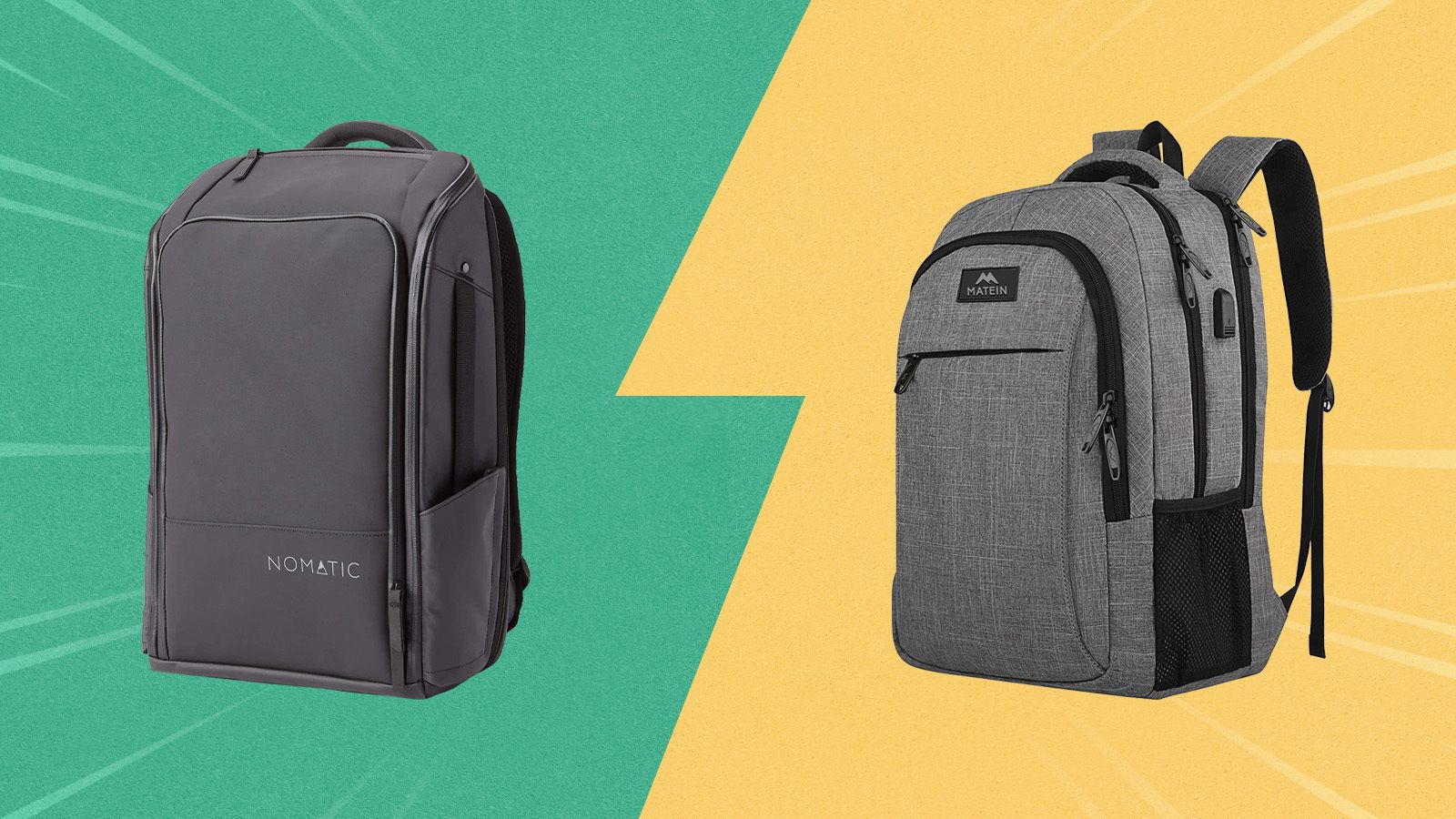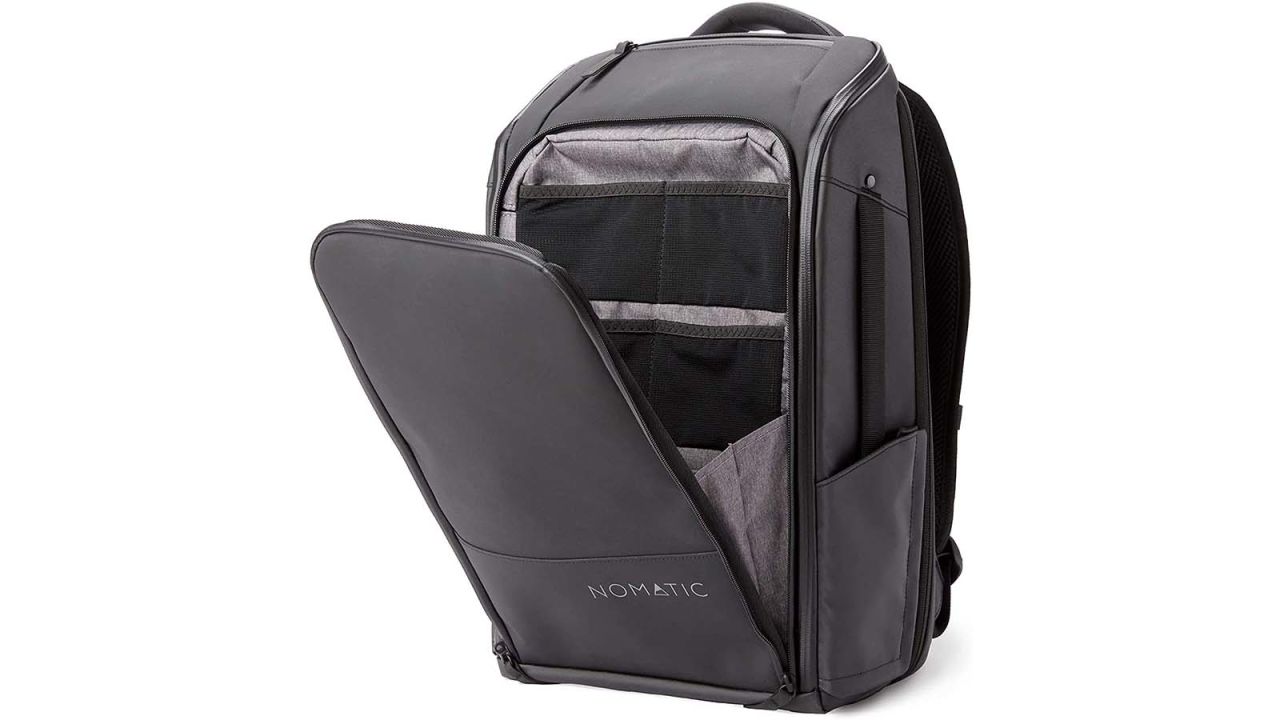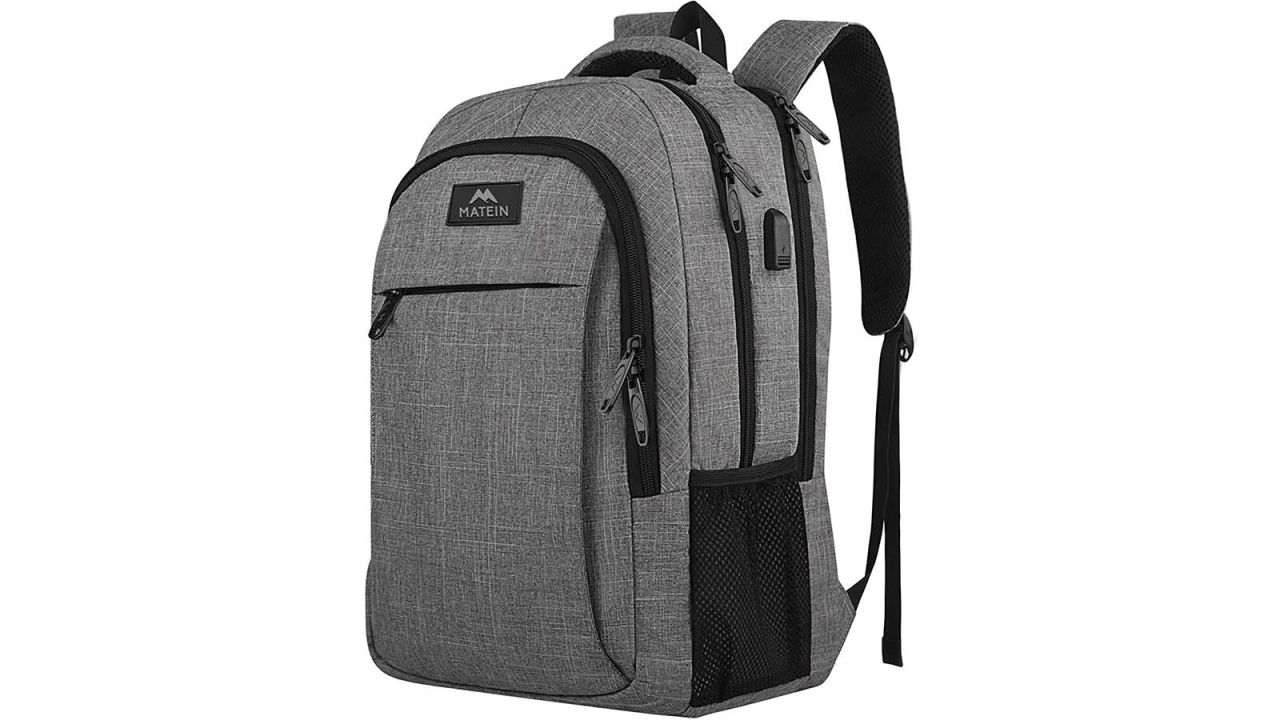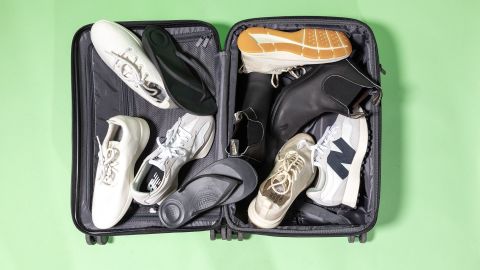All road warriors know this to be true: Travel backpacks are the superior carry-on. Between organizational features galore, easy access to your essentials and the comfort of two straps over one, backpacks trump totes when it comes to carry-ons. Let’s face it: Hands-free is always the way to go.
But not all travel backpacks are made alike. A reigning favorite of editors and consumers — and arguably the one with the most swagger — is the Nomatic Backpack. Boasting a durable, water-resistant exterior and a whopping 28 pockets, the Nomatic is best known for its optionality. It can pivot from a backpack to a briefcase, for instance. And it can increase its capacity by 20% (up to 24 liters), thanks to an expansion zipper. All those offerings come at a price, sadly, and the Nomatic’s isn’t cheap — the 20-liter Backpack comes in at $280.
Decidedly more austere, but even more beloved by Amazon reviewers, is the Matein Travel Laptop Backpack. Priced at just $30, the Matein is Amazon’s No. 1 bestseller in laptop backpacks, with more than an astounding 81,000 reviews and a 4.7-star rating. What makes it so great? Well, for one, there’s that price. And despite costing just $30, the Matein comes with a water-resistant exterior, three compartments full of pockets, a laptop sleeve, a USB port, hanging clasps and more.
Which travel backpack is the better buy? To get to the bottom of it, I’ve been testing both products over the past month, using them for daily and travel transport alike.
Nomatic vs. Matein at a glance
An industry favorite, the Nomatic is impeccably designed, featuring 28 pockets, a clamshell opening, an expansion zipper, magnetic water bottle pockets and the ability to be carried like a briefcase too.
Boasting nearly 80,000 positive Amazon reviews, the Matein is a favorite because it has 17 pockets and clutch details like a USB port, hanging clasps and a laptop sleeve. Oh, and it's made of a water-resistant material and at a very favorable price point.
Quick comparison
| Dimensions | 19 inches x 13 inches x 5.75 inches (7.75 inches when expanded) |
18 inches x 12 inches x 7.8 inches |
|---|---|---|
| Weight | 4 pounds |
1.68 pounds |
| Capacity | 20 liters - 24 liters |
28 liters |
| Laptop | 17 inches |
15.6 inches |
| Pockets | 28 |
17 |
| Water-resistant | Yes |
Yes |
| YKK zippers | Yes |
No |
| Trolley sleeve | Yes |
Yes |
| RFID-protection | Yes |
No |
| Warranty | Lifetime |
Lifetime, excludes zipper or buckle damage |
| Price | $280 | $30 |
The Nomatic 20L Backpack and the Matein Travel Laptop Backpack are both ideal travel backpacks because they come with dozens of built-in pockets, sleeves and compartments, all meant to keep you organized while on the go. Both are pegged for shorter trips from one to three days, and the backpacks are each water-resistant and?have luggage sleeves, water bottle holders and lots of other doodads that are helpful when juggling the stresses of travel.
In terms of look and feel, the Nomatic is definitely more luxe, comprising fancier, sleeker materials, while the Matein skews more utilitarian, with no-frills fabrics. Nomatic is also bigger and heavier than the Matein, which is something to consider if you don’t like carrying heavy loads. Both bags, however, are small enough to fit under the airplane seat. And ultimately, both are quality options when deciding what your next travel backpack should be.
Design
When it comes to a travel backpack, design is everything. Key details like strategically placed pockets or, say, a USB port can be the difference between a good trip and a great trip. Nomatic wins here, as it is one of the most thoughtfully designed products I’ve ever tested. First and foremost, it features a side handle that can turn the backpack into a briefcase in an instant — use it as a backpack while commuting to the meeting, but tuck the straps under the padded backing and use it as a briefcase while walking into the meeting when you need to look more professional. Next up is the zipper that runs the full perimeter of the bag, creating a clamshell-style opening that is great for visibility and finding things — basically you pack it like you would a suitcase. My final favorite design detail is the expansion zipper that expands the bag by 20%, increasing capacity from 20 liters to 24 liters.
Beyond that, Nomatic also comes chock-full of organizational design features like dual compartments (one main, one for accessories), a luggage trolley sleeve, a 16-inch laptop sleeve, a tablet sleeve, a documents sleeve, a retractable keychain, a built-in hard glasses case, mesh slot pockets, mesh zippered pockets, interior side pockets, easy access exterior pockets, a hidden pocket and even two magnetic water bottle pockets that ensure the backpack maintains a tight profile when no bottles are being toted. I also love Nomatic’s fleece-lined quick-access pocket located at the top of the bag, perfect for valuables like your phone, wallet or keys.
One complaint would be that the bottle pockets, while strategically designed, are a bit narrow and can’t fit bigger bottles like the Yeti 26-ounce Rambler. Beyond that, however, it’s obvious that there was an exorbitant amount of thought put into the Nomatic’s design — to put it plainly, this is what you’re paying top dollar for.

The fact that Matein can even be compared to Nomatic while costing nine times less is a feat. No, it doesn’t have all the trappings of the former, but it does hold its own with 17 pockets, three compartments, a 15.6-inch laptop sleeve, a luggage strap, a built-in keychain and two handy hanging clasps for attaching carabiners, scarves or whatever else you have a need for.
A big selling point of the Matein backpack is the embedded USB port that allows for internal or external charging on the go — though you need to own or buy a power bank in order to utilize this fun feature. Matein also has two water bottle pockets that are stretchier than the Nomatic and could fit the Yeti 26-ounce Rambler, but they’re also shallower, and I was perpetually nervous the bottle was going to fall out.
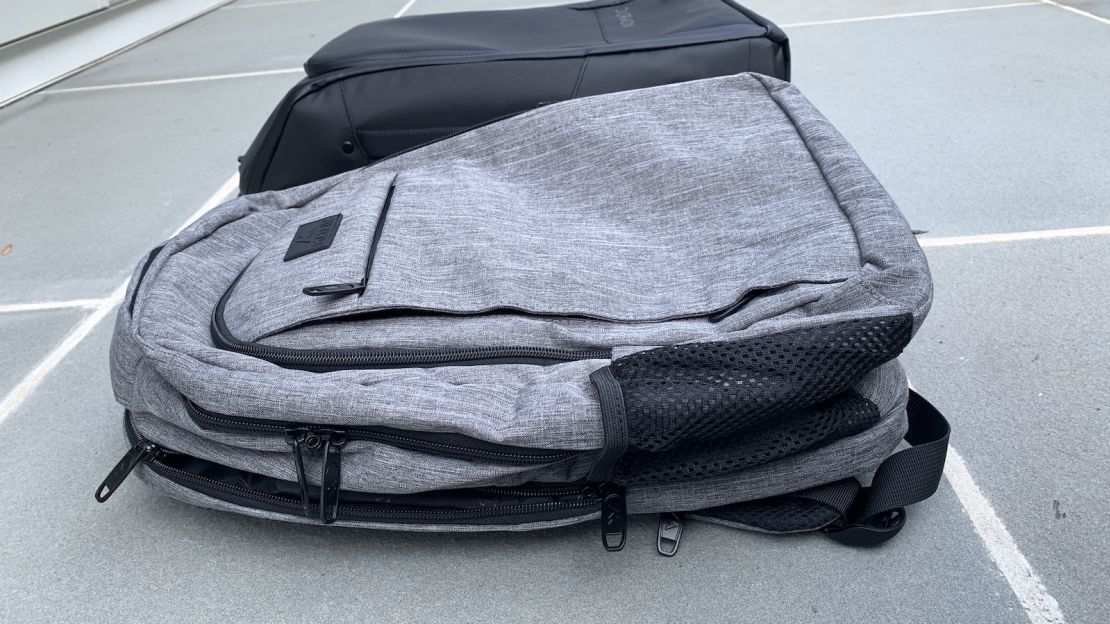
Size
The Matein is certainly smaller and lighter, which I like, but I found that it also can store less — which isn’t ideal if you need it to fit several days’ worth of clothes, in addition to your essentials (laptop, tablet, Kindle, phone, chargers, jewelry, toiletries, etc.). With some strategic packing, I was able to fit one day’s worth of clothes, plus a toiletry bag. Remarkably, even though the Matein’s size dimensions are smaller than the Nomatic, it has a larger packing capacity at 28 liters compared to Notmatic’s maximum of 24 liters when expanded.

In the Nomatic, I was able to fit two days of clothing, an additional pair of shoes and a toiletry case when the bag was fully expanded.?While some reviewers had complained the bag was too big on shorter users, I didn’t have that problem — at 5 feet, 4 inches tall, I found the backpack hit the center of my lower back, which is exactly where the Matein hit as well. Given that the Nomatic is a bit taller, it rose higher above my shoulders, probably an inch or so more than the Matein.
Comfort
Whether you’re commuting to work or traveling overseas, comfort is a key factor when deciding which travel backpack is best for you. Nomatic excels here — though not by much — with its foam-like padded paneled back and mesh pad-lined straps. The journey is going to be plush wherever you’re going. I also like that Nomatic offers a chest strap that is adjustable both in height (it has a nifty sliding mechanism that is genius) and in tightness. The chest strap definitely helps to distribute the pack’s overall weight — a detail that is missing from the Matein design.

That said, the Matein backpack is pretty comfortable too. Its straps feature a padded mesh lining alongside ventilated, padded mesh shoulder panels on the back of the bag. A padded mesh panel also provides comfy lower back support while simultaneously encapsulating the backpack’s hidden anti-theft pocket. The problem here is that if you were to store anything other than a passport, smartphone or ultra-thin wallet, you’re going to have the indent of that item protruding into your lower back, which isn’t fun ever — especially when you’re running to catch a flight.
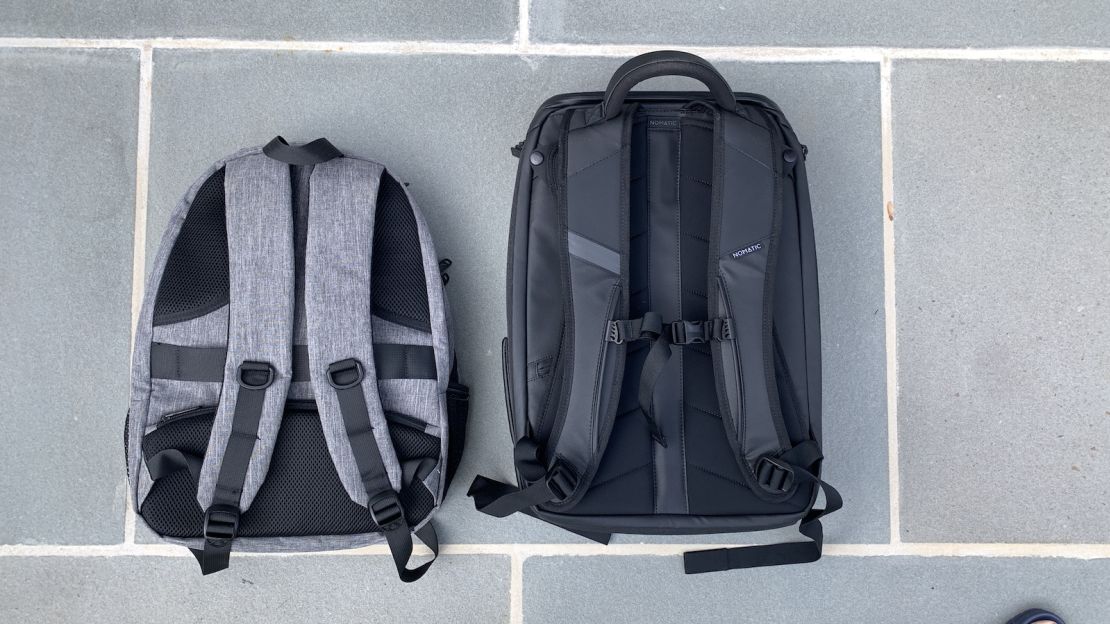
Durability
A core tenet of sustainable living is investing in quality products that will stand the test of time despite constant, rigorous use. Nomatic is getting the job done here in multiple ways. For one, its exterior is a coated tarpaulin fabric that is not just water-resistant but also scratch- and slash-resistant due to its rubbery, thicker nature. The brand also employs YKK zippers, which are long known to be the best and strongest zippers in the biz. On the interior, multiple materials are at play, from a luxe polyester liner to fleece, more tarpaulin and even a buttery-soft nylon/mesh pocket. These fabrics aren’t just fancy — because they are — but they’re also durable enough to withstand the trials and tribulations of travel.
In comparison, Matein’s materials feel cheaper and more generic. The brand’s water-resistant outer material is a scratchy polyester that isn’t slash-proof. Inside the backpack, there’s more polyester that is shiny and makes loud crinkling sounds. Is this par for the course for a $30 backpack? Surely. But when placed side by side with Nomatic, it’s inferior. Also, Matein uses basic metal zippers, not YKK.
The trolley sleeve solution is another weakness for Matein, as the bag relies on a flimsy nylon strap across its back to adhere to your luggage’s telescopic handle. Having attempted this several times, I found the strap’s excess slack resulted in the weight of the backpack tipping both items over. Nomatic, however, has a luggage “sleeve” that is basically a handle-sized tunnel carved into the underside of the pack’s padded back panel. This system was taut and strong and resulted in my backpack always being securely adhered to my rolling luggage.
Anti-theft features
While both backpacks label themselves as being somewhat anti-theft, in comparison to other bags in this category, they’re a bit behind given that neither has lockable zippers or locking cables. Nomatic does, however, have an RFID-protected pocket on the interior of its front flap, and it has a hidden pocket located under the padded back panel that is so hidden, in fact, I had a hard time locating it.
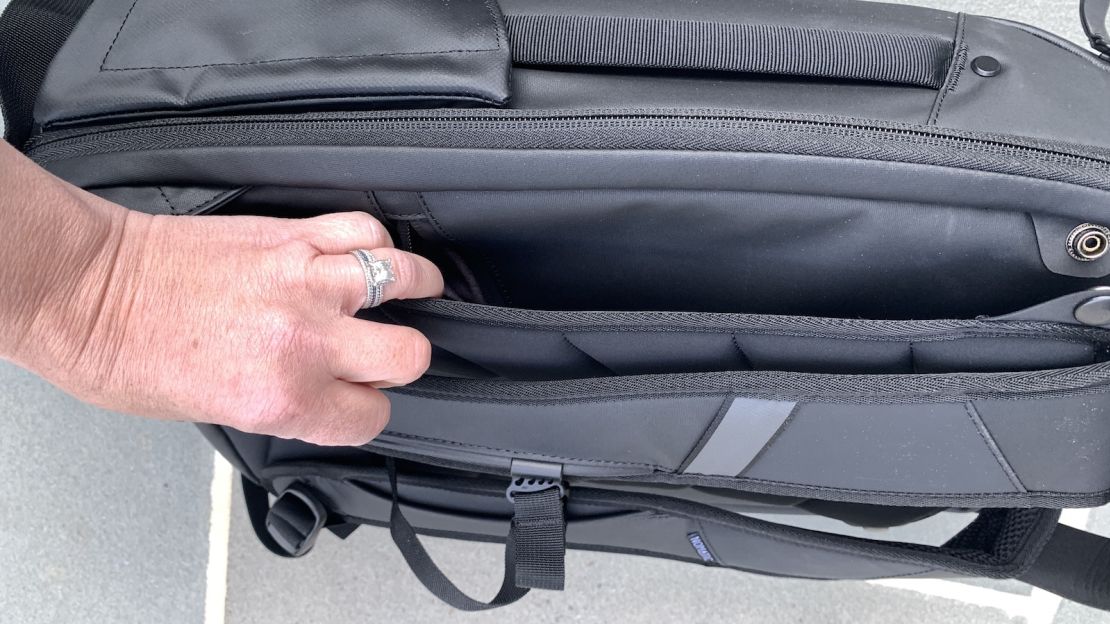
As I mentioned earlier, Matein has a hidden anti-theft pocket on its lower back panel. When the backpack is not being worn, the pocket is better described as being hidden in plain sight because it’s actually very visible. When you’re wearing the backpack, though, it’s great for storing items like your wallet and passport you want to keep out of reach of thieves. What’s great is that the pocket is easily accessible and relatively innocuous because it matches the above ventilation panels. The downside is that you can only place items with a flat, slim profile in there; otherwise, it will be poking your lower back the entire time.

Bottom line
Hands down, Nomatic is the better product here, and to say that it’s a traveler’s dream would be an understatement. If you can afford the Nomatic, which is admittedly expensive, it’s well worth the purchase and will last you for many vacations to come — especially because of its lifetime warranty.
What impresses me is that Matein is able to offer a lot of similar details at such a drastically lower price. If you’re on a budget and looking for a solid travel backpack, Matein will also serve you well without breaking the bank.
Looking for a travel credit card? Find out which cards CNN Underscored chose as our?best travel credit cards?currently available.
